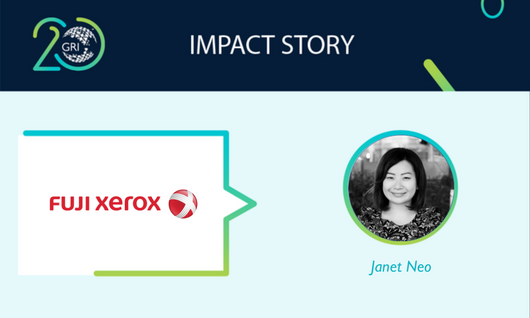GRI Impact Story Fuji Xerox: Excellence in Leadership and Stakeholder Engagement

GRI GOLD Community member Fuji Xerox Asia Pacific has been using the GRI framework since 2003. We spoke with Janet Neo, Head of Corporate Sustainability at Fuji Xerox Asia Pacific, to find out how the document services and communications company views the practice of sustainability reporting.
Janet Neo: For Fuji Xerox, corporate social responsibility is synonymous with good corporate management. We place a high priority on communication and monitoring to help incorporate stakeholder evaluations and feedback into the management of our business. Sustainability reporting plays a vital role in this communication process. Through our reports, we inform our stakeholders of our performance in CSR management and also of our on-going transformation into a sustainable business. We aim to achieve excellence in leadership and stakeholder engagement through our sustainability reporting activities.
How has Fuji Xerox benefited from reporting using the GRI framework?
The GRI reporting framework has provided us with an important reference on best practice in public disclosure of sustainability information. We have been reporting with the GRI framework for nearly 15 years now, and continue to benefit from its use. The GRI Standards are a universal language that we use for our sustainability management. They standardize what we measure and, from an operational perspective, reduce the effort involved in reporting. With the requirements set out in the GRI Standards, the local employees in charge can collect appropriate information without reinventing the wheel. We are able to collect robust data across all our Asia Pacific operations. These data forms part of our corporate business planning and long-term strategy.
Fuji Xerox does global reporting on sustainability impacts, but also local reporting. What has this local perspective brought to the company and its stakeholders?
We have a widespread footprint across the Asia Pacific region, from some of the most developed countries in the world, to developing nations. Each of our operating locations has their own unique sustainability issues and concerns. To maximise our effectiveness in communicating with our various stakeholders, we started local reporting. In financial year 2016, we published one global and eleven local sustainability reports. The local reports are specifically designed to address local needs and concerns. For instance, biodiversity and community development were two topics that were particularly important for our operations in ASEAN, and our stakeholders there. We also focused on local sustainability initiatives in our local reports, to provide our readers easier reference to understand our footprint in their region of concern.
How has the GRI reporting framework helped Fuji Xerox in tackling negative impacts?
As an example, in South East Asia, irresponsible practices has led to environmental degradation and public health crises, especially in recent years. We used the GRI framework to develop our supplier management program. We take part in the Forest Stewardship Council (FSC) certification for our paper products and continuously strengthen our engagement and participation in ecological conservation. In addition, in Thailand last year, over 250 staff members participated in mangrove reforest activities to conserve endangered forest areas. Similarly, in Malaysia, we have signed a five-year memorandum of understanding with the local authorities, agreeing to plant 20,000 mangrove trees by the year 2020.
Also, following the GRI framework to conduct materiality assessments with stakeholders, we detected that limited access to primary education and low primary education completion rates are two challenges in Indonesia, Myanmar, the Philippines, Thailand, and Vietnam, where Fuji Xerox Asia Pacific operates. We believe that business flourishes in thriving local communities. To close the gap on early childhood education, in 2014, we developed a regional initiative, in 2014, focusing on youth education, with a target to help 100,000 children by 2023. By engaging our business partners and local NGOs, we developed a multi-stakeholder approach to reach the outskirts of cities and sustain these learning programs.
Fuji Xerox helps other companies with communications processes and workflows, two important aspects of the capacity-building businesses are faced with when they begin sustainability reporting. Can you tell us more about this?
Since before Fuji Xerox Asia Pacific became a GRI GOLD Community Member in 2016, we have been encouraging our peers and customers in the Asia Pacific to utilize sustainability reporting for better business practices. Through our sustainability report, participation in industry groups and other stakeholder engagement activities, we have been sharing our experiences as a reporter and building awareness among companies, especially within the C-suite.
We have also rolled out solutions to assist our customers in overcoming the technical barriers in reporting. And we offer a variety of green solutions to help customers manage and improve the environmental performance in their organizations. In Hong Kong, for instance, following the environmental, social and governance (ESG) reporting requirements by the Stock Exchange of Hong Kong (SEHK), we noticed that our customers (listed companies) struggle with ESG disclosure to their stakeholders. Inspired from our years of hands-on experience in sustainability reporting, we formed a cross-departmental team, with sustainability, product development and programming professionals, to develop a new ICT software using our innovation and technologies to streamline and standardize the reporting process.
With the GRI Sustainability Reporting Standards, companies are able to unlock the transformative power of transparency, while contributing to the common sustainability agenda and reaping the benefits of increased stakeholder trust. Visit the GRI 20th Anniversary hub for more impact stories, and join the effort to create a sustainable global economy.

